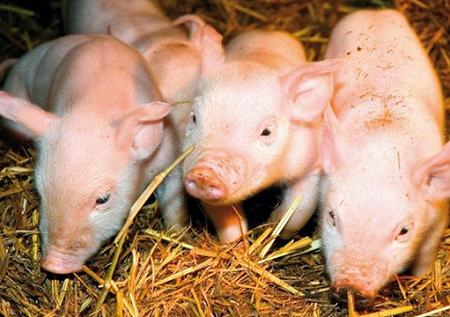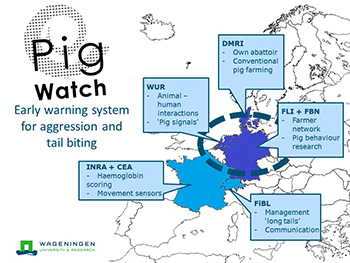PigWatch
ERA-NET project enables inclusive approach of behavioral problems of pigs

Tail biting and aggression between finishing pigs are injurious behaviours affecting health, welfare and productivity. Many solutions to these behavioural problems have been researched extensively and include tail docking, provision of environmental enrichment and increasing group stability. Nevertheless, their effectiveness differs considerably between research labs and commercial practice, and between farms. A lot of the success of these measures is related to the stage it is in when it is detected. The earlier, the better. Preventive tail docking is one of the most commonly used solutions, but EU legislation has banned routine tail docking years ago.
Common policy on tail docking
However, following the ban, pig farmers across the whole of Europe still indicate they are unable to comply with it, and the national governments face difficulties enforcing the law. This demonstrated the need to address the issue of injurious tail biting on an international scale. Therefore, in 2015, governments of the Netherlands, Germany and Denmark took an initiative to step up the implementation of EU legislation on the docking of pig tails and to promote collaboration and research to succeed. The research project PigWatch is initiated on the basis of this common policy and brings together partners from the three countries concerned, plus two other countries.
Hans Spoolder, researcher and EU account manager at Wageningen Livestock Research, is coordinator of this project: “The common policy of the three national governments triggered me to write this ERA-NET research proposal, especially because all three countries participated in the third ANIHWA joint call on animal welfare. This provided for me a good basis to write a proposal that would contribute to the implementation of their common policy.”
Added value of transnational cooperation
The project consortium consists of partners from the Netherlands, Germany, Denmark, France and Switzerland. The project is well into its second year and appears to be an excellent match of knowledge, expertise, technology and experience which should enable the team to deliver a decision farming tool to detect tail biting and aggression in finishing pigs at an early stage. Furthermore, the project consortium will establish farmer focus groups, linked with each other through an international network. Finally, the project will develop an in-line detection system of lesions at the abattoir. Spoolder: “The added value of this transnational cooperation is that we are able to tackle the behavioural problems of pigs with an inclusive approach. In the Netherlands we know a lot, but some things are better tackled by specialist in other countries.”
Spoolder sees many other benefits in international research in general and in ERA-NET projects in particular: “In my experience an important advantage of transnational research projects is the possibility to involve leading European scientists in the project in order to get strong research consortia. Moreover, I would like to mention that transnational research reduces duplication of efforts in the participating countries, which saves tax payers money. A benefit of ERA-NETs is that they offer direct access to several national networks, whereby a wider application of results is possible’. Another advantage of ERA-NETs, according to Spoolder, is that the research topics are chosen and supported by national policy makers. Due to this, public funding goes straight to the policy priorities of the country.”

Spoolder sees many other benefits in international research in general and in ERA-NET projects in particular: “In my experience an important advantage of transnational research projects is the possibility to involve leading European scientists in the project in order to get strong research consortia. Moreover, I would like to mention that transnational research reduces duplication of efforts in the participating countries, which saves tax payers money. A benefit of ERA-NETs is that they offer direct access to several national networks, whereby a wider application of results is possible’. Another advantage of ERA-NETs, according to Spoolder, is that the research topics are chosen and supported by national policy makers. Due to this, public funding goes straight to the policy priorities of the country.”
Pigwatch is one of the 11 research projects under the third ERA-NET ANIHWA joint call on animal health and welfare that was launched in 2014. The total budget of the call was €10M, funded by 16 countries.
Researchers in the spotlight with projects funded through jointly programmed calls
One of the aims of joint programming is aligning research & research funding and this usually results in a joint call to which proposals can be submitted. In a series of interviews, researchers from Wageningen University and Research present their granted projects from such joint calls.
